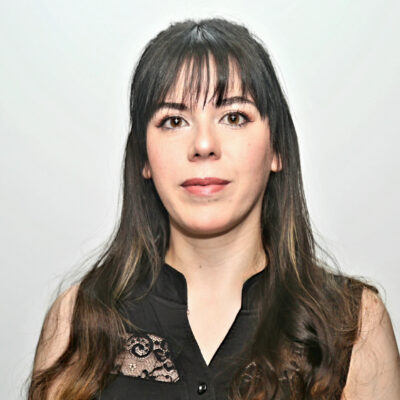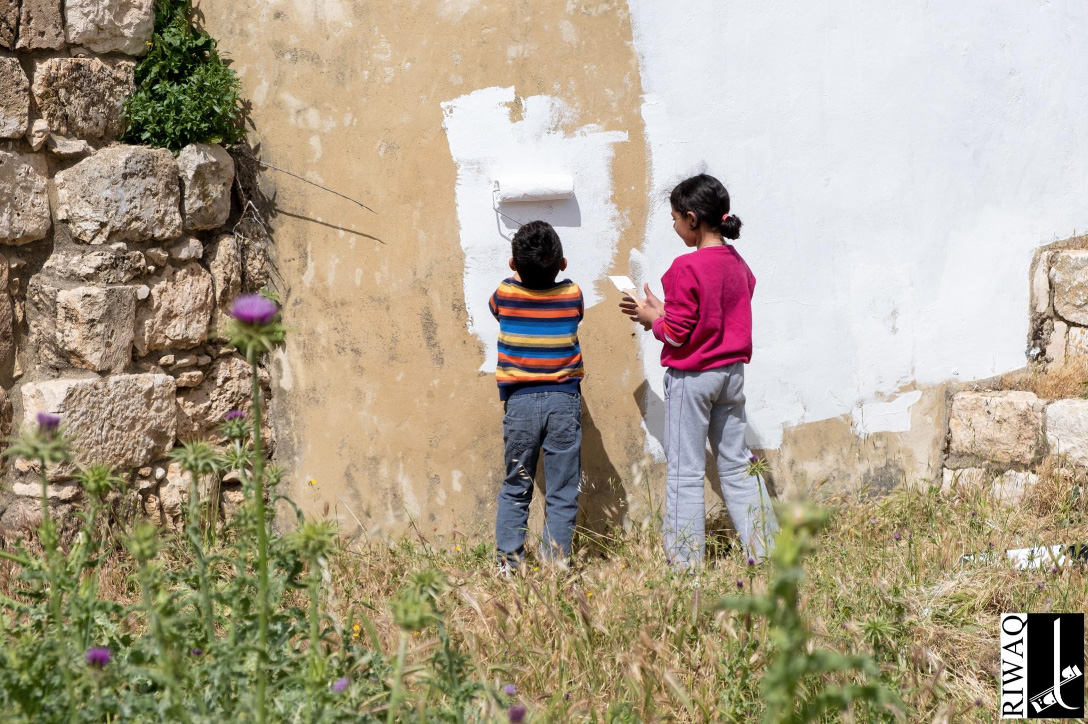
Palestine’s Riwaq – Centre for Architectural Conservation
Muntaha Abed
“Riwaq prioritises protecting and using local knowledge when preserving history, and adapting it to contemporary societal needs. This creates a dialogue that considers young people, heritage and indigenous knowledge.”
With an architectural heritage that dates to the Bronze Age, Iron Age, Roman and Byzantine eras, Palestine is rich in architectural history. The Life Jacket project developed by the Riwaq Centre for Architectural Conservation, collaborates with communities restore threatened historic buildings and repurpose them as community spaces.
Its prioritises include:
- Collaborating with the community
By documenting community needs, Riwaq is able to adapt the restoration plans according to requirements. - Accessing local know-how
Riwaq holds frequent consultations with the community, council and local stonemasons, which leads to buildings that draw on local skills, and meet contemporary needs. - Supporting housing projects (Reciprocity العونة)
By expanding to include historic private houses, Riwaq supports projects for families restoring their own houses and community members learning building skills. - Partnering with women to create inclusive cultural spaces
In villages without an independent space for women, Riwaq works alongside women activists to rehabilitate buildings as women’s associations.
Palestine’s rich architectural heritage includes remains from the Bronze Age, Iron Age, Roman and Byzantine eras, however most of these sites are not protected or preserved due to Israeli restrictions, seizures of land, borders, and a lack of funding.
In a complex political context in which Palestinian communities are scattered geographically across segregated territories and borders, this precious history is rapidly deteriorating. Historic buildings in cities, villages and towns across Palestine have been left abandoned and undocumented.
Riwaq is a non-profit organisation established in 1991 by just three members. At a time when architectural heritage was not prioritised, Riwaq began to collect a registry of historic buildings throughout the country. It was the first organisation to document and archive heritage buildings in 422 villages and towns across the West Bank, Jerusalem and Gaza. From this first simple step, it has expanded to restoring heritage buildings as community assets.
Riwaq has also conducted extensive research and experimental work on traditional materials and construction methods, which have allowed it to undertake sympathetic restorations.
One of Riwaq’s flagship projects is the Life Jacket Project; which aimed to protect, restore and regenerate rural Jerusalem. In the past, the villages surrounding Jerusalem functioned in a interdependent cultural and economic relationship with the city. Trade, crafts and culture were connected between them. However, this dynamic cycle was fractured by multiple blockades which separated the villages from Jerusalem. Riwaq initiated the Life Jacket project as a way to reconnect these communities and rehabilitate their spaces.
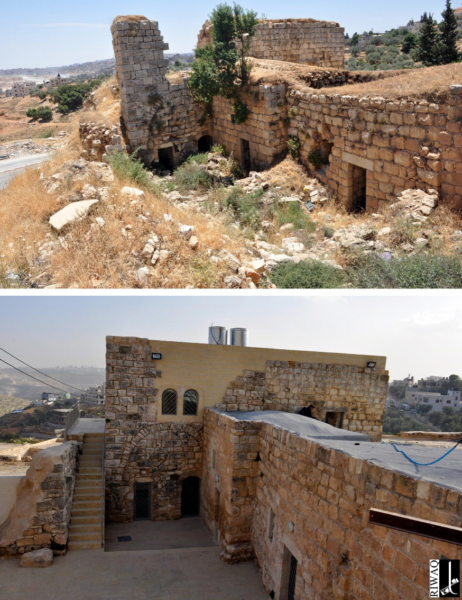
Top: Caption (photo 1): Hosh Naser and Barakat Attic in Kafr ‘Aqab before renovation-2017
Bottom: Caption (photo 2): Hosh Naser and Barakat Attic in Kafr ‘Aqab after renovation-2017
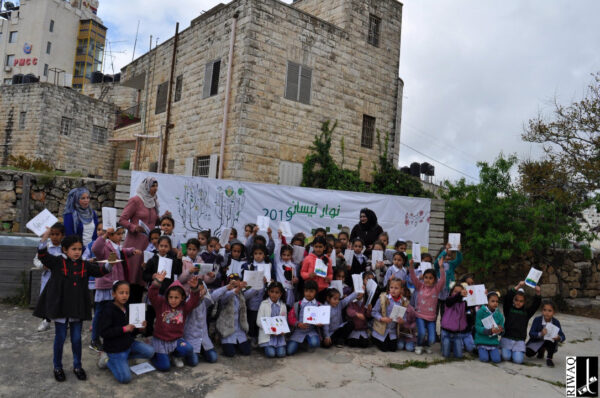
School students’ activity in Nuwwar Nissan, 2019
The Life Jacket project launched in 2017 as a collaboration between Riwaq and the Jerusalemite rural communities. Women, children and marginalised workers formed an essential part of the restoration process. They were involved in every step of the process, and were then able to use the rehabilitated buildings to establish youth clubs, libraries, and women’s associations in highly marginalised area.
The Life Jacket project reconnected villages through social networks and revitalised cultural activities. It supported local economies to tackle the geopolitical challenges they faced, including geographic dispersion and physical barriers.
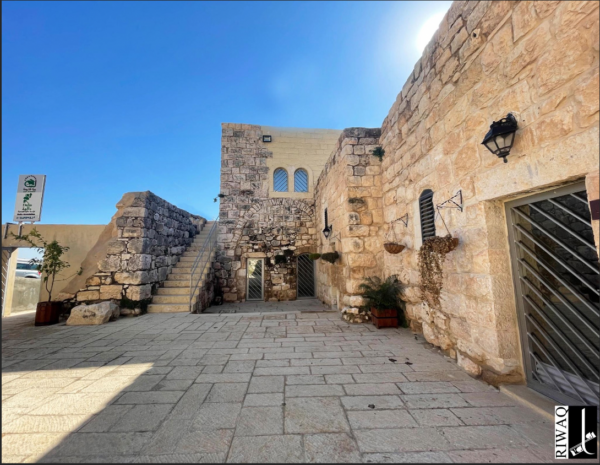
Dalia Association: Hosh Naser and Barakat Attic in Kafr ‘Aqab after renovation, 2020
Collaborating with the community
ished artists
Riwaq’s rehabilitation strategy involved multiple oral-history sessions. This innovative method documented the needs of the local community, especially women, children and marginalised people. It meant that multiple buildings were restored according to community requirements and dedicated as libraries, women’s associations, and even an art residency in the village of Qalandiya.
Accessing local know-how
Riwaq prioritises protecting and using local knowledge when preserving history, and adapting it to contemporary societal needs. This creates a dialogue that considers young people, heritage and indigenous knowledge. Restored sites serve as historical accumulations of art and culture in the form of hubs such as libraries and youth clubs. They fulfil the needs of young people, recontextualise local knowledge and give a voice to rural communities and indigenous knowledge.
Supporting Housing projects (Reciprocity العونة)
Riwaq expanded its rehabilitation project to include private historic houses. The organisation’s strategy was to provide professional consultations and restoration material, while the family residing in the house, along with the people of the village, worked together to restore and renovate the premises. This strategy created local job opportunities by establishing a teaching program for students and workers to learn restoration basics.
Through this bottom-up approach, the housing project also revived the traditional concept of community reciprocity and solidarity. It strengthened community relationships, and supported families to preserve their houses and enrich the built environment of rural Jerusalem.
Partnering with women to create inclusive cultural spaces
In villages that lacked an independent space for women, Riwaq worked alongside local women and gender activists to rehabilitate buildings as inclusive spaces for women.
During the pandemic these historic buildings served as cultural and supportive hubs for women with free courses such as music, painting, folkloric dance, and handicrafts, as well as counselling and legal services.
Check out the other case studies from Palestine
Re-reading Culture, Conversing with Land
The dynamic arts space nourishing Palestinian culture
A project led by:

In partnership with:
![]()
Muntaha Abed (she/her)
| Muntaha Abed (she/her) is a West Asian scholar, from the Levant Region. Muntaha is currently undertaking her PhD dissertation titled Gendering Uprisings: South Korean and Palestinian Student Mobilization affiliated with the Interdisciplinary Social Sciences Program at Birzeit University. She holds an MA in Gender and Sexuality with a Special Reference to the Middle East, from the School of Oriental and African Studies in London. Her work explores the marginalisation of bodies under colonial and societal hierarchies. Her current interest is focused on gender and social movement dynamics in the Global South, as a way to initiate new epistemic dialogues between multi-sited discourses. |
What is the Imagine Around the World Project?
A partnership with the British Council Australia, the Imagine Around The World Project aims to document case studies from numerous countries outside of US, UK, Canada, Australia and New Zealand to share best practice and leadership in cultural diversity, cultural equity and inclusion in the arts, screen and creative sectors. This project is managed by Diversity Arts Australia and supported by Creative Equity Toolkit partner, British Council Australia. To find out more click below – or read the other case studies as they go live here.
Check out the other case studies from Palestine
Re-reading Culture, Conversing with Land
The dynamic arts space nourishing Palestinian culture
A project led by:

In partnership with:
![]()

